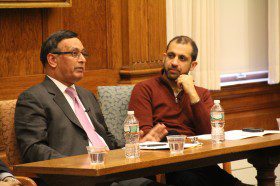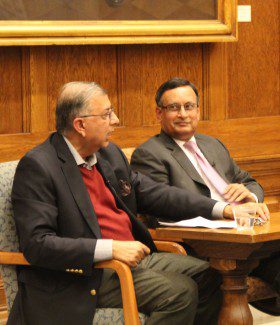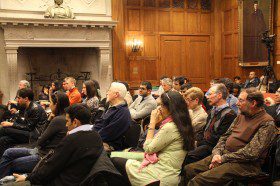“There needs to be a fundamental shift in what it means to be Pakistani,” said Husain Haqqani, author of Magnificent Delusions: Pakistan, the United States, and an Epic History of Misunderstanding at a SAI Book Talk on Monday, March 10, 2014.
Haqqani has a unique insight into the relationship between the two countries – he was Pakistan’s ambassador to the U.S. from 2008 to 2011, and is now a professor of International Relations at Boston University. Shuja Nawaz, Director of the South Asia Center at the Atlantic Council, joined Haqqani for the discussion, and the event was chaired by Asim Khwaja, Sumitomo-Foundation for Advanced Studies on International Development Professor of International Finance and Development at Harvard Kennedy School.
Haqqani’s general argument is that the U.S.-Pakistan relationship has been based on misunderstandings; he argues that the relationship between America and Pakistan is based on mutual incomprehension and always has been, since 1947. Pakistan—to American eyes—has gone from being a quirky irrelevance, to a stabilizing friend, to an essential military ally, to a seedbed of terror. America—to Pakistani eyes—has been a guarantee of security, a coldly distant scold, an enthusiastic military enabler, and is now a threat to national security and a source of humiliation. The countries are not merely at odds, he argues. Each believes it can play the other—with sometimes absurd, sometimes tragic, results.
He explained that he is not trying to be anti-Pakistani; the book is his “attempt to be critical from within,” given his unique role as a first-hand witness. Tracing the history of Pakistan since its founding in 1947, Haqqani commented on some of the delusions that have plagued the relationship. He argued that Pakistani national identity became about military and a security state, and that there needs to be a “fundamental shift in what it means to be Pakistani.” Another delusion: The U.S. has assumed that by using Pakistan in its global structure, it was buying an ally through continuous aid.
He encouraged the two countries to think deeply about their relationship, and what each can gain, given that “we don’t share enemies, and we don’t share a common interest.” He said the two countries need to stop thinking in terms of “a dependent relationship that breeds resentment,” and said Pakistan needs to work on solving its own problems: the economy, education system, and “getting rid of an ideological paradigm that doesn’t let us live in the 21st century.”
Nawaz also argued that there needs to be a national debate about the relationship, and said that there needs to be more of an ownership of the issue in Washington. There has been a disconnect of intentions since the beginning, and a “battle of narratives,” he argued. A strong economy is vital for ultimate security, something that Nawaz said Pakistan needs to work on.
The event ended on an optimistic note, with both speakers looking forward to the future of improving the relationship. Given that Pakistan is now much more prevalent in American discourse because of recent events, Haqqani hopes that a productive dialogue can be initiated: “Good diplomacy requires cool conversations,” he explained. “Not one party always walking out.”
After the event, SAI spoke to several attendees to get their opinion on the discussion:
“What I thought was most fun was the discussion section – you see that a lot of the people who were talking [in the Q&A] had a very clear-cut opinion about what they think.. So for me, I tend to think of it as, yes, a dialogue needs to happen, and money has never solved the problems between countries and allies. I think that Haqqani definitely opened up my eyes to the conversation more, and he has a problem – he’s going up against ideology, which is the greatest enemy. So I thought it was eye opening and definitely interesting.”-Dan Carman, Student, Boston University
“I think it was a good talk. It’s part of a long conversation that needs to go on, and a diversity of perspectives. I think the speakers both explained it pretty well. The two countries definitely don’t have enough understanding of each other.”
-Aqil Sajad, Physics graduate student, Harvard University
“I know a lot more leaving here than when I came in, which is why I wanted to come. I never, and I still don’t understand – I know there’s a depth [to the relationship], it’s kind of intriguing. As an undergrad, I had a roommate from Pakistan, and this past summer, when I came back to Harvard, I had a roommate from India. Two radically different approaches to things, and each other, and I‘m still learning, which is one of the reasons I wanted to come here today. I was really kind of surprised by the numbers – that 83% of Pakistani citizens are anti-American. That could be kind of a temporary wave – let’s hope it is.”
-Jeffery Mcnary, Fellow, Creative Writing, Harvard University
“Before I took [Haqqani’s class at BU], I wouldn’t say I was an expert on Pakistan, and I took his class, and it really opens your eyes to how central Pakistan is to so many problems that we have now, and they come from starting the alliance with Pakistan. And I think, the American public in general, it would be nice if we were all more educated on [the issues], especially with everything related to Afghanistan.”
-Shanti Kapoor, Student, Boston University
“A great pair of analysts on Pakistan-U.S. affairs with quite matching narratives.”
-Ahmad Balal, Fellow, Harvard Weatherhead Center for International Affairs
“I liked that it was an informal talk that discussed things that were very pertinent… We were able to learn about the issue in an informal way.”
–Aroosha, Student at the Harvard Extension School
What do you think of Haqqani and Nawaz’s view on US-Pakistan relations? Join the conversation on Twitter using the hashtag #SAIPakistan, or share your thoughts on our Facebook page.
-Meghan Smith



